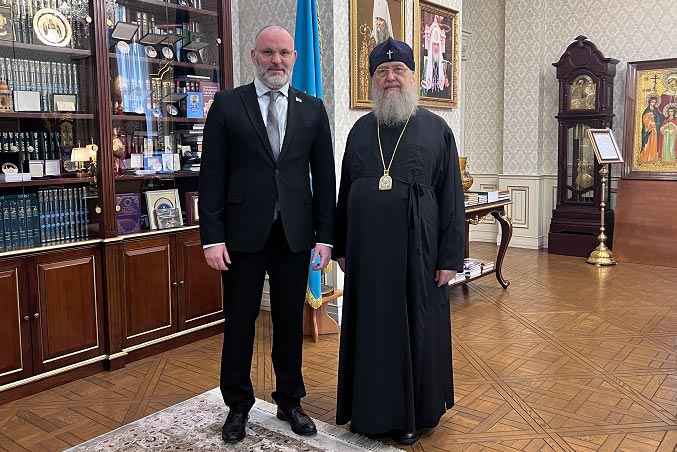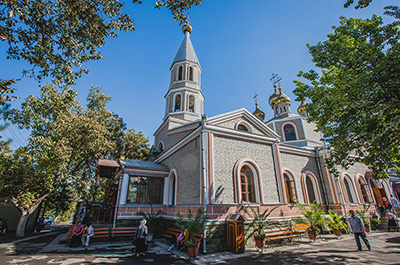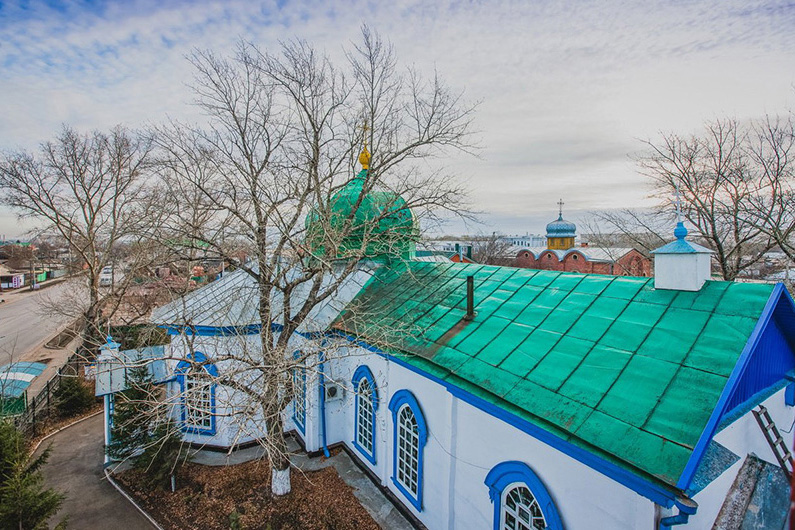
Week of Thomas - Antipascha. Metropolitan Alexander celebrated the Liturgy at the Assumption Cathedral in Astana (+VIDEO)
- 12.05.2024, 12:24
- Новости на английском языке

May 12, 2024 – 2nd week of Easter (Antipascha), remembrance of the assurance of the Apostle Thomas.
Metropolitan Alexander of Astana and Kazakhstan performed the Divine Liturgy with the Easter rite in the main church of the country - the Assumption Cathedral in Astana.
The head of the Orthodox Church of Kazakhstan was concelebrated by: dean of the Astana church district Archimandrite Sergius (Karamyshev), rector of the temple in honor of the icon of the Mother of God “Joy of All Who Sorrow” Archpriest Evgeniy Vorobyov, keymaster of the Assumption Cathedral of the city of Astana Archpriest Dimitry Baidek, keymaster of the Constantine-Elenin Cathedral Archpriest Sergiy Kaliev , cleric of the Church of the Monk Seraphim of the Sarovsky City of Astana Hieromonk Siluan (Sinegubov), Deputy Klyuchar of the Ascension Cathedral, Priest Andrei Shklyar, the head of the Orthodox youth movement of the Astana deanery, Priest Grigory Kulikov, Priest Sergiy Lubnevsky, Klyuchar of the Kazan Cathedral of Alma, Priests Rubinsky, Protodiaco Nikolai Grinkevich, Protodiaon, Grinkevich, Protodiaon. Head of the Metropolitan Protocol Service, Protodeacon Roman Golovin, Protodeacon Vladimir Syrovatsky, Protodeacon Alexander Mokiy, Deacon Ilya Davydov, Deacon Alexander Piven, Deacon Mikhail Chumakov.
For the festive Liturgy, an ark containing part of the stone from the Holy Sepulcher was delivered to the main church of the Republic. At the request of Metropolitan Alexander, the keeper of the keys of the Church of the Holy Sepulcher in Jerusalem, Sheikh Wajih Nusseibeh, gave the shrine as a gift to the Orthodox people of Kazakhstan, with the blessing of His Beatitude Patriarch Theophilus III of Jerusalem.
The chants were performed by the cathedral choir under the direction of Olga Varentsova.
Using the communion verse, Priest Grigory Kulikov read out the Easter message of Metropolitan Alexander of Astana and Kazakhstan.
At the end of the Liturgy, a procession of the cross around the church and Easter glorification took place, after which the Metropolitan pronounced the exclamation “Christ is Risen!” in different languages, ancient and modern, he congratulated the clergy and laity on the celebration of St. Thomas Week and said a word of teaching on the topic of the Gospel reading about the assurance of the Apostle Thomas.
“The first Sunday after Holy Easter is called St. Thomas Sunday. The Church remembers the appearance of the risen Christ to the Apostle Thomas. This disciple of the Lord “was careful not to be found,” that is, by the special Providence of God, he was not with the other apostles during the first appearance of the risen Christ. In response to the joyful cries of the apostles: “We have seen the Lord,” he said: “Unless I see the nail marks in his hands and put my finger where the nails were, and put my hand into his side, I will not believe” ( John 20:25).
After eight days, the Savior again appears to the eleven apostles, including this time Thomas. Christ the Life-Giver, risen from the dead, addresses the doubting disciple: “Put your finger here; see my hands. Reach out your hand and put it into my side. Stop doubting and believe” (John 20:27). Then from his lips, from the depths of his heart, came that confession to which the Apostle Thomas remained faithful even to death: “My Lord and my God!” In the church hymns of this day, the doubt of the Apostle Thomas is called “good unbelief.” Good unbelief is not persistence in lies or wandering in doubt, but a thirst for faith, a desire for Truth. In Thomas’s disbelief there was a desire to comprehend the great mystery of the Resurrection himself. Twenty centuries have passed since the days of the appearance of the Risen Christ to the apostles, but even now we greet with awe of deep joy the bright day of God’s saving Easter, together with the Apostle Thomas exclaiming: “My Lord and my God!” From the sermon of Metropolitan Alexander.





















